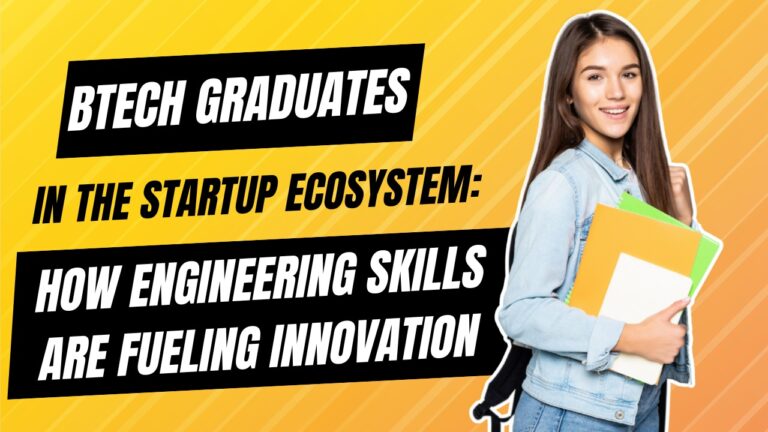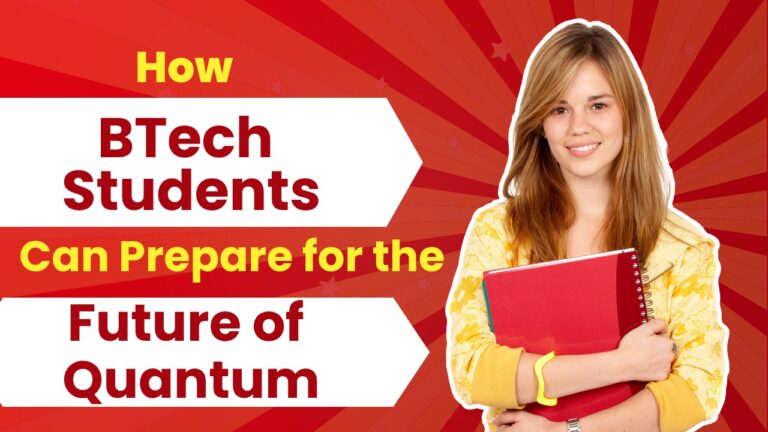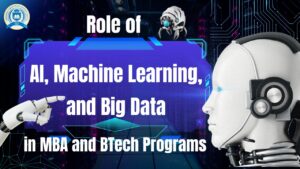
Imagine leading the next tech revolution—not just by building cutting-edge software, but also by strategically scaling it into a global...

Imagine leading the next tech revolution—not just by building cutting-edge software, but also by strategically scaling it into a global...

What do Flipkart, Ola, and Zerodha have in common? Apart from being some of India’s most successful startups, they were...

When we think of healthcare, we usually picture doctors, nurses, and medical equipment. But behind every successful hospital or healthcare...

Are you a BTech graduate wondering what’s next? You’re not alone. Every year, thousands of engineering students find themselves asking...

Imagine a computer so powerful it can solve problems in seconds that would take traditional supercomputers years. Sounds like science...

Imagine leading the next tech revolution—not just by building cutting-edge software, but also by strategically scaling it into a global product. Sounds exciting, right? Welcome to the evolving world of work, where the fusion of engineering and management skills is setting new benchmarks in innovation. As industries transform at breakneck

What do Flipkart, Ola, and Zerodha have in common? Apart from being some of India’s most successful startups, they were all co-founded by engineering graduates. The startup wave isn’t just about business ideas—it’s about problem-solving, technical execution, and innovative thinking, all of which are deeply rooted in engineering education. Today,

Imagine a computer so powerful it can solve problems in seconds that would take traditional supercomputers years. Sounds like science fiction, right? Welcome to the world of quantum computing—a technology that’s no longer in the distant future but fast becoming a present-day reality. If you’re a BTech student, you have

In today’s fast-paced digital world, the fusion of technology with education is revolutionizing how we learn and what we learn. Artificial Intelligence (AI), Machine Learning (ML), and Big Data are no longer buzzwords confined to tech companies—they are now integral parts of modern MBA and BTech programs, especially those offered

In today’s world, where climate change and environmental degradation dominate global concerns, sustainability is no longer a luxury—it’s a necessity. Engineering, being a cornerstone of innovation and infrastructure, plays a critical role in shaping a sustainable future. That’s why integrating sustainability into BTech programs, especially in the realm of distance

Imagine leading the next tech revolution—not just by building cutting-edge software, but also by strategically scaling it into a global product. Sounds exciting, right? Welcome to the evolving world of work, where the fusion of engineering and management skills is setting new benchmarks in innovation. As industries transform at breakneck speed, the blend of BTech (Bachelor of Technology) and MBA (Master of Business Administration) has become one of the most powerful combinations to thrive in today’s hybrid economy. In this blog, we explore how these two degrees—when combined—are not just creating better professionals, but also driving disruptive innovation in technology and business. Whether you’re a student, a working professional, or an aspiring entrepreneur, understanding this synergy can shape your future in ways you never imagined. The Evolving Workplace—A Perfect Storm of Tech and Strategy The future of work is no longer about choosing between tech and business—it’s about integrating both. Rapid advancements in AI, automation, data analytics, and blockchain are changing the way companies operate, hire, and scale. At the same time, organizations need leaders who can understand how technology intersects with business goals, consumer needs, and market dynamics. Interesting Fact: According to a World Economic Forum (WEF) 2023 report, by 2027, over 50% of all workers will need to upskill or reskill to remain relevant. The report also highlights that roles combining tech and business acumen are expected to be among the fastest growing. Why BTech + MBA is the Power Combo of the Future 1. Tech-Driven Decision Making A BTech degree teaches the fundamentals of engineering, system design, and technical problem-solving. Pair that with the strategic thinking, leadership, and financial acumen of an MBA, and you get professionals capable of making data-backed, tech-informed decisions at the leadership level. 2. Versatility Across Industries Whether it’s fintech, healthtech, edtech, e-commerce, or supply chain, companies want leaders who understand both the technology stack and the business model. A BTech + MBA profile fits perfectly across these verticals. 3. Startup and Entrepreneurial Edge From Flipkart to Ola, India’s startup ecosystem is full of engineers who used their tech background to solve a real-world problem—and then used business skills to scale. An MBA gives BTech graduates the vision, funding knowledge, and market insight needed to transform a prototype into a profitable enterprise. Real-World Impact—Case Studies of Tech-Business Innovators These aren’t isolated examples. They reflect a larger trend of engineers evolving into business leaders, driving transformation at scale. Rise of Dual-Skilled Professionals Employers are actively seeking professionals who can bridge the gap between IT teams and executive boards. In fact, a 2023 LinkedIn report showed a 46% increase in job postings demanding cross-functional expertise—especially roles like: With hybrid roles becoming more mainstream, a single-skill approach is no longer enough. Top MBA Specializations for BTech Graduates If you’re a BTech grad considering an MBA, choosing the right specialization is crucial. Here are the top trending ones aligned with future work roles: Way Forward—Preparing for the Future of Work So, how can students and professionals future-proof themselves? Conclusion As we enter the era of intelligent automation, global connectivity, and digital disruption, companies aren’t just looking for coders or strategists—they’re seeking leaders who can do both. A BTech + MBA combo is no longer just a career move; it’s a strategic advantage in a future defined by innovation, collaboration, and continuous evolution. So, if you’re on the fence about blending tech and business education, remember: the future of work belongs to those who can innovate, integrate, and lead.

What do Flipkart, Ola, and Zerodha have in common? Apart from being some of India’s most successful startups, they were all co-founded by engineering graduates. The startup wave isn’t just about business ideas—it’s about problem-solving, technical execution, and innovative thinking, all of which are deeply rooted in engineering education. Today, BTech graduates are emerging as key players in the startup ecosystem, not just as tech leads, but as founders, product architects, and innovation drivers. Whether it’s fintech, edtech, healthtech, or AI-based platforms, engineers are powering India’s new-age economy. Let’s explore how and why BTech graduates are reshaping the startup landscape—one breakthrough at a time. Why Startups Love Engineering Talent Startups thrive on building innovative solutions quickly and efficiently—and that’s exactly where engineers shine. With their training in analytical thinking, coding, system design, and technology integration, BTech graduates bring the core skill sets startups need to survive and scale. Key Advantages Engineers Bring to Startups: According to a 2023 report by Nasscom, over 48% of Indian startup founders have an engineering background—proving that BTech grads are not just supporting innovation but leading it. Top Domains Where Engineers Are Making a Mark While engineering skills are applicable across sectors, some startup domains are particularly ripe for tech-driven disruption: 1. Fintech From payment gateways to robo-advisors, engineers are building scalable platforms that are transforming how India transacts. Startups like PhonePe, Razorpay, and Groww are led by tech-focused teams. 2. EdTech Engineering minds have built platforms like BYJU’S, Unacademy, and Vedantu, revolutionizing learning experiences using AI, gamification, and interactive UX. 3. HealthTech Startups such as Practo and 1mg are combining data science with healthcare delivery—often led by engineers turned entrepreneurs. 4. AI and Machine Learning Fields like natural language processing, predictive analytics, and computer vision rely heavily on engineering know-how, making BTech grads the perfect fit. From Employee to Entrepreneur—The BTech Startup Journey Many engineers begin their journey as developers or product managers in startups. Over time, exposure to business models, user behavior, and product-market fit often ignites an entrepreneurial spark. Common Steps on This Journey: A 2023 Inc42 report noted that over 35% of tech startups in India were bootstrapped by engineering founders who coded their own MVPs before raising any capital. How Colleges Are Encouraging Startup Culture Among BTech Students The entrepreneurial spirit is growing right on campus. Many top engineering colleges now offer: Even Tier-2 and Tier-3 colleges are establishing entrepreneurship development cells (EDCs) to encourage startup ideas and connect students with angel networks and accelerators. Success Stories of BTech Graduates in Startups These examples show that engineering knowledge, when combined with a vision, can build billion-dollar businesses. Conclusion In today’s fast-paced startup ecosystem, engineering skills are no longer confined to the back end. BTech graduates are leading innovation, driving strategy, and redefining industries through their startups. Whether you dream of founding your own venture or joining an ambitious young company, your engineering background is a solid launchpad. So if you’re a BTech student or graduate asking “What’s next?”, remember: Your skills can fuel innovation, solve global problems, and maybe even build the next unicorn.

Imagine a computer so powerful it can solve problems in seconds that would take traditional supercomputers years. Sounds like science fiction, right? Welcome to the world of quantum computing—a technology that’s no longer in the distant future but fast becoming a present-day reality. If you’re a BTech student, you have a front-row seat to this tech revolution. But the question is: are you preparing yourself to be part of this breakthrough? In this blog, we’ll explore what quantum computing is, why it matters, and most importantly, how BTech students like you can gear up for a future in this transformative field. Whether you’re in computer science, electronics, or even mechanical engineering, quantum computing has something big in store for everyone. What is Quantum Computing and Why Is It a Game-Changer? Unlike classical computers that process data in binary (0s and 1s), quantum computers use qubits, which can represent 0 and 1 simultaneously thanks to the principle of superposition. Add in entanglement and quantum tunneling, and you have a machine capable of solving incredibly complex problems. Real-World Impact: According to a 2024 McKinsey report, the quantum computing market could surpass $90 billion by 2040, and over 5,000 jobs in quantum tech were listed globally in 2023 alone. Why BTech Students Need to Pay Attention As industries begin to adopt quantum technologies, the demand for skilled professionals is surging. Companies like IBM, Google, Microsoft, and Amazon are heavily investing in quantum research. For BTech students, this is not just an academic trend—it’s a career-defining opportunity. Key Skills BTech Students Should Master 1. Quantum Physics Fundamentals Start with the basics: superposition, entanglement, and quantum gates. Free resources like MIT OpenCourseWare or NPTEL offer beginner-level lectures tailored for engineering students. 2. Linear Algebra and Probability Theory Quantum algorithms rely heavily on matrix operations and probability. A solid grasp of these concepts is essential. 3. Programming Languages for Quantum Development Languages like: Learning these gives you hands-on experience in writing quantum algorithms and simulating quantum circuits. 4. Cloud-Based Quantum Platforms You don’t need a quantum computer at home to start experimenting. Platforms like: It offer free or low-cost access to real quantum hardware and simulators. Recommended Courses and Certifications These courses not only strengthen your resume but also connect you with a global community of learners and professionals in the field. How Colleges Are Integrating Quantum Tech into BTech Programs In India and globally, top institutions are updating their BTech curricula. For example: As a student, actively enrolling in these electives or online programs can set you apart from your peers.Internships and Research Opportunities Explore internships with: Check platforms like Internshala, LinkedIn, and AngelList regularly for openings. Early exposure will give you a competitive edge when applying for full-time roles. Building a Quantum-Ready Portfolio Start small: Having a visible online presence shows recruiters your passion and initiative. Final Thoughts: Embrace the Uncertainty—Quantum Style! The future is uncertain—and in quantum terms, that’s a good thing! As a BTech student, this is your chance to be part of something revolutionary. By building your foundation now, you’ll be ready to ride the wave as quantum computing moves from research labs to real-world applications. The quantum era is coming. Will you be ready to code the future?

In today’s fast-paced digital world, the fusion of technology with education is revolutionizing how we learn and what we learn. Artificial Intelligence (AI), Machine Learning (ML), and Big Data are no longer buzzwords confined to tech companies—they are now integral parts of modern MBA and BTech programs, especially those offered through distance learning platforms. Whether you’re an aspiring business leader or a future engineer, understanding how these technologies shape your education and career prospects is crucial. Let’s explore how AI, ML, and Big Data are transforming online MBA and distance BTech programs, making them more relevant, practical, and career-focused. Why AI, ML, and Big Data Matter in Higher Education Employers across all industries are looking for professionals who can understand and apply AI-driven insights, work with data, and lead tech-enabled transformation. As a result, top online MBA and BTech programs are evolving to embed these cutting-edge subjects into their curriculum. Here’s why this matters: By integrating AI and data science into the learning process itself, distance education is becoming more interactive, personalized, and impactful. AI and Big Data in Distance Learning MBA Programs Online MBA programs are no longer just about strategy, marketing, and finance—they’re about leading in a data-driven world. Here’s how AI and Big Data are shaping the modern MBA: 1. Smarter Learning with AI AI-powered platforms adapt the learning experience to each student’s pace and style. Through real-time feedback, personalized dashboards, and smart recommendations, flexible MBA courses are now more effective than ever. 2. Courses in Data-Driven Decision Making Many distance learning MBA programs now offer electives like: These courses teach future leaders how to interpret data, understand algorithms, and make informed decisions—essential skills in today’s digital economy. 3. Project-Based Learning with Real Datasets Using case studies and actual business datasets, MBA students can apply machine learning tools to solve real-world problems. This practical approach enhances problem-solving and strategic thinking. AI and ML in Distance Learning BTech Programs For BTech students, AI, ML, and Big Data aren’t just electives—they’re foundational pillars of modern engineering. 1. Core Curriculum Evolution Top distance learning BTech programs now include: These subjects are preparing students for in-demand roles like AI engineer, data scientist, and ML developer. 2. Practical Labs and Virtual Simulations Thanks to AI-enabled labs and virtual environments, students in online BTech courses can now run simulations, debug code, and analyze data without ever stepping into a physical lab. 3. Capstone Projects in Emerging Tech BTech students are encouraged to work on capstone projects involving real-world AI applications—such as building chatbots, predictive models, or even smart IoT systems using machine learning techniques. Benefits of Learning AI & Data Science Through Distance Education Choosing a distance learning program in MBA or BTech with a focus on AI, ML, or Big Data comes with powerful advantages: Most importantly, students gain job-ready skills that align with what the industry demands. Final Thoughts As AI, Machine Learning, and Big Data redefine industries, it’s essential for future business leaders and engineers to master these technologies. Whether you choose an online MBA with a focus on data-driven leadership or a distance learning BTech program in AI and analytics, you’re setting yourself up for a successful, future-proof career. The best part? With today’s flexible online education platforms, gaining these skills doesn’t require a campus. The classroom is wherever you are—and the future is just a few clicks away.

In today’s world, where climate change and environmental degradation dominate global concerns, sustainability is no longer a luxury—it’s a necessity. Engineering, being a cornerstone of innovation and infrastructure, plays a critical role in shaping a sustainable future. That’s why integrating sustainability into BTech programs, especially in the realm of distance learning education, is more important than ever. Why Sustainability Matters in Engineering Engineers design systems, structures, and technologies that impact the planet for generations. When sustainability becomes a core part of a BTech curriculum, future engineers learn how to create solutions that are not only innovative but also environmentally responsible. From renewable energy systems to green buildings and sustainable manufacturing practices, today’s students need to be equipped to solve tomorrow’s challenges. Evolution of BTech Education: Going the Distance With the rise of online BTech programs and distance learning engineering degrees, access to quality technical education has become more flexible and inclusive. These platforms offer flexible BTech courses that allow students to learn at their own pace without compromising on the depth or quality of education. As more students opt for online learning, there is a unique opportunity to embed sustainability deeply into these programs—making it a standard, not a specialization. Distance learning platforms are now incorporating modules that focus on: These topics ensure that students not only master technical skills but also understand the environmental implications of their work. The Benefits of a Sustainability-Focused BTech Curriculum Conclusion The integration of sustainability into distance learning BTech programs is a forward-thinking move that benefits students, industries, and the environment. Educational institutions must continue evolving their curricula to meet the demands of the future while remaining accessible to learners everywhere. Whether you’re a recent high school graduate or a working professional looking to upskill through an online BTech in engineering, choosing a program that emphasizes sustainability will not only shape your career but also contribute to engineering a greener tomorrow.
Shiksha Group of Institutions, established in 2009, is committed to transforming the landscape of education by making quality learning accessible and affordable for all. With a vision to empower aspiring students and enable them to achieve their dreams, ShikshaGroup offers world-class distance education programs tailored to meet diverse learning needs.
© 2023 Shiksha Group Of Institutions. All rights reserved.